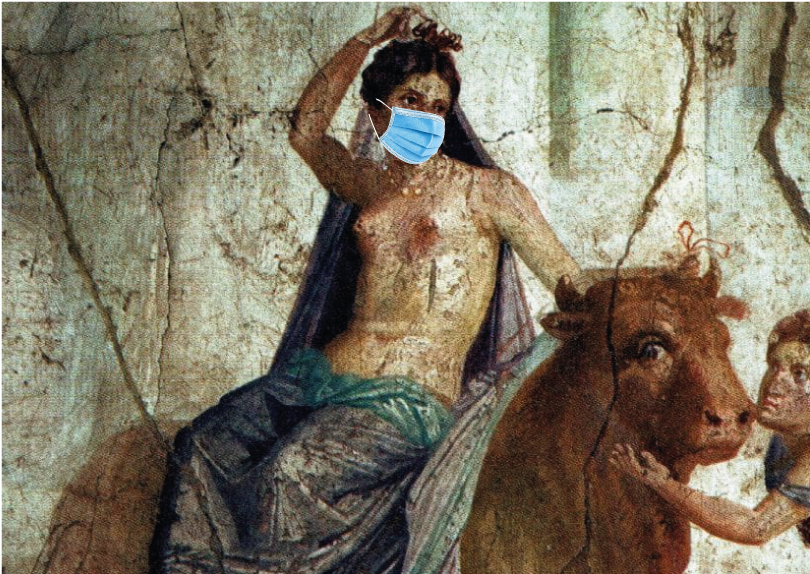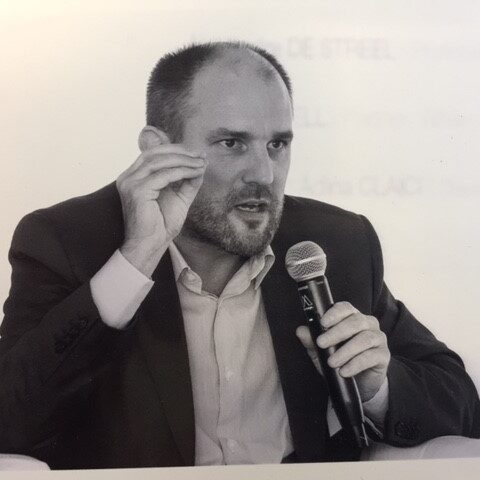
Europa on the Bull, fresco from the House of Jason in Pompei
The European University Institute (EUI) cordially invites you to join a series of webinars on the impact of the coronavirus crisis on competition policy and regulation of digital markets in Europe. The online seminars are organised by the EUI in the context of the Florence Competition Programme (FCP) and the Florence School of Regulation – Communications and Media (FSR C&M).
In times when the free movement of individuals is seriously constrained by COVID-19, this initiative aims to establish an online platform of discussion among academics, practitioners, officials from national governments and EU institutions, as well as industry representatives.
The webinars take place every Friday, lunch time, via Zoom. Participation to the webinars is free of charge. However, prior online registration is required for each webinar. Registrations open every Monday of the webinar’s week.
Webinar Series Programme
COVID-19 and new ‘digital’ business models
Friday, 19 June 2020, 13.00 – 14.00 CET
Europe is expected to face an unprecedented economic crisis in the wake of the COVID-19 pandemic. Self-isolation measures, implemented to prevent the coronavirus from spreading, challenge the traditional means of distribution of goods and services. COVID-19 will likely speed up the digital transformation, already underway in Europe before the crisis. The aim of this webinar is to discuss new ‘digital’ business models introduced by many firms to adapt to new challenges generated by COVID-19.
Presentation
- Digital Business Models After COVID-19 – Pier Luigi Parcu
Chairperson:
 Pier Luigi Parcu
Pier Luigi Parcu
EUI
[Bio]
Speakers:
 Roland Doll
Roland Doll
Deutsche Telekom
[Bio]
Fundamental rights & COVID 19
Friday 26 June 2020, 14.00 – 15.00 CET
In response to COVID-19, national governments are searching for solutions to limit large gatherings of people by maintaining ‘social-distancing’ measures even after the end of the initial coronavirus lockdown. Many governments are developing new mobile phone applications to monitor individuals’ movements. Such apps would collect a large amount of personal data, relying on algorithms to develop predictive models aimed at limiting the concentration of individuals in a single place. While the use of such tools can be justified in light of public health concerns, they may enable State authorities to track the movements of millions of individuals. Such practices represent a potential breach of EU citizens’ privacy. This webinar proposes to explore to what extent that measures intended to contain further spread of COVID-19 might comprise a breach of fundamental rights of EU citizens and, particularly, EU data protection rules.
Presentation
- Fundamental Rights and COVID-19 – Mario Viola de Azevedo Cunha
Chairperson:
 Mario Viola de Azevedo Cunha
Mario Viola de Azevedo Cunha
EUI
[Bio]
Speakers:
 Wojciech Wiewiórowski
Wojciech Wiewiórowski
European Data Protection Supervisor
[Bio]
Excessive v. unfair prices during the coronavirus crisis
Friday 3 July, 13.00 – 14.00 CET
COVID-19 has disrupted the global supply chain, causing a shortage in a number of products. During the first phase of the pandemic, the price of certain medical equipment, such as protective masks and hand sanitiser, increased substantially, especially via e-commerce platforms. Numerous competition authorities in Europe have opened investigations vis-a-vis these price increases as possible cases of exploitative abuse of dominance. Other countries have introduced temporary forms of price controls to stop the price rise. The first question discussed in the webinar will be whether, and to what extent, competition law would be the most appropriate tool to fight cases of excessive prices, instead of consumer law protection and ad-hoc price regulation. Secondly, we explore the question of whether competition authorities might adopt interim measures to stop such price increases, especially in the light of the Broadcom interim decision recently adopted by the European Commission.
Presentations
- Excessive vs Unfair Pricing during Coronavirus Crisis – Marco Botta
- A view on remedies – Wolf Sauter
Chairperson:
Speakers:
Competition policy enforcement vis-a-vis GAFAM in the aftermath of COVID-19
Friday, 10 July 2020, 13.00 – 14.00 CET
In recent years, the market behaviour of digital tech companies (i.e. so called GAFAM) has been the subject of close antitrust scrutiny by the European Commission and several competition authorities in Europe. During the coronavirus pandemic crisis, however, the public image of GAFAM has changed. For example, Amazon has provided home delivery services, an essential service in a period when shop fronts around the world are shuttered. Similarly, Facebook connects people confined to their homes and filters ‘fake news’ content concerning COVID-19. The question discussed in the webinar will be whether, and to what extent, the increased relevance of GAFAM in the context of the coronavirus pandemic might lead antitrust enforcers in Europe to re-consider their pending competition law investigations.
Chairperson:
 Giorgio Monti
Giorgio Monti
EUI/Tilburg University
[Bio]
Speakers:
 Enzo Marasà
Enzo Marasà
Portolano Cavallo LLP
[Bio]
Telecom networks as an essential facility in times of COVID-19
Friday, 17 July 2020, 13.00 – 14.00 CET
During the COVID-19 lockdown, smart working and distance education have become increasingly commonplace. Telecom networks have become ‘essential facilities’, allowing individuals to work, learn, stay informed and in touch whilst remaining at home. As a result, the lockdown has seen increased pressure on networks from an uptick in streaming. This has lead to network congestion and decreased Internet speed in several European countries. In the coming months, a new outbreak of the coronavirus cannot be ruled out. With this in mind, the question is whether and to what extent telecom operators are ready to cope with network congestion following a potential second outbreak of the coronavirus and what solutions could be implemented in this regard. This webinar thus intends to examine the role of telecom networks in the context of the COVID-19 pandemic.
Chairperson:
;
Speakers:
 J.Scott Marcus
J.Scott Marcus
Bruegel
[Bio]

 Michal Gal
Michal Gal Wassim Chourbaji
Wassim Chourbaji Paolo Boldi
Paolo Boldi Deirdre Curtin
Deirdre Curtin Marco Botta
Marco Botta Wolf Sauter
Wolf Sauter Valérie Meunier
Valérie Meunier Jean-François Bellis
Jean-François Bellis Nicolas Petit
Nicolas Petit Audrey Scozzaro Ferrazzini
Audrey Scozzaro Ferrazzini Alexandre De Streel
Alexandre De Streel Clelia Lorenza Ghibaudo
Clelia Lorenza Ghibaudo

